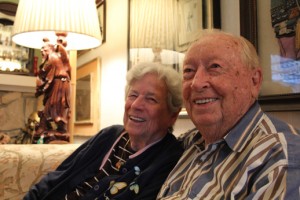
Virginia and Tom Boles
Editor’s note: The following is an exact transcript of the Easter message The Rev. Tom Boles will deliver on Easter Sunday. The longtime pastor is co-founder of the Midnight Mission serving the homeless on Skid Row and is a proverbial icon in Whittier religious circles. He is a frequent contributor to this website. He and his wife, Virginia, live in La Habra.
Our search for tomorrow
MATTHEW 28:1-10; COLOSSIANS 3:1-4; JOHN 20:1 -10
By The Rev. Tom Boles
You know by now how the drama of Easter unfolds. It begins two day earlier, on Good Friday.
Jesus of Nazareth was crucified by the Roman authorities at the instigation of the religious authorities.
He was nailed to a cross and a sword pierced his side. The soldiers affixed a sign above his head which read, “Jesus of Nazareth, King of the Jews.”
Death came rather swiftly and mercifully, after only about six hours. Some crucified men lingered for days, which has led some writers to propose that Christ died of a broken heart. After a Roman centurion confirmed His death, Pontius Pilate, the Roman prefect for that territory, granted permission to a man named Joseph of Arimathea to claim His body.
Joseph of Arimathea was wealthy and a pious man, a member of the Jewish Sanhedrin, who had become a follower of Jesus. Joseph was aided by a wealthy Pharisee by the name of Nicodemus. It was Nicodemus, you will remember, who had to come to Christ under the darkness of night to ask Him about His teachings. It was to Nicodemus that Christ said that in order for him to enter the kingdom of God, Nicodemus would have to be born all over again.
Evidently the message took, for when Jesus’ closest disciples had fled in fear, there was Nicodemus aiding Joseph of Arimathea in claiming Jesus’ body.
Carefully and with much effort they removed the nails from the Master’s hands and feet and lowered him to the ground. Along with a group of women who had remained close by through it all, Joseph and Nicodemus hastily prepared Christ’s body for burial.
Opening prayer:
Praise to you, ‘O God, for you have raised up your Son, our Savior, from the dead and gave Him glory, giving us faith and hope in You. Praise be to You, ‘O Christ, You are the resurrection and the life. And, by your glorious resurrection, you brought life and immortality to light. Praise to you, ‘O holy spirit, you shed abroad the love of Christ, in our hearts, and made us rejoice in the hope of glory. All praise, thanks, dominion, and power be unto you, blessed Trinity, now and forever more. Amen.”
Somebody ought to write a book titled, “Preachers are funny creatures.” It makes no difference if they are pastors, priests or rabbis, people who have the wonderful privilege as I do of standing in front of good Christians, each week are somewhat weird. Like the famous Rev. Eugene Magee. Magee is an enthusiastic pastor who does not wear a robe.
His sanctuary is plainer than most, adorned only by a cross and an American flag. Magee likes to wave his arms to emphasize important points in his sermons. Unfortunately, he is so animated that he has trouble keeping his shirttails in his trousers. To solve this he had developed the habit of periodically stuffing his shirttails back into his trousers as inconspicuously as possible. Even while he is preaching.
One Easter Sunday, while admonishing the faithful with great excitement, he fished around behind his back in the usual way, and found more material than usual to push out of sight. He persisted doggedly, however, on and on he preached and on and on he stuffed.
At the close of his sermon he discovered that he had about half of the American flag stuffed into his pants. He felt foolish, of course. But what would you expect? It was Easter Sunday! What pastor can help but get excited on Easter Sunday? We get excited because we see faces on Easter that we might not see on most Sundays of the year.
Just before the service today I heard one young fellow ask his dad: “Dad, where are the Christmas trees that were here the last time we were here? That’s a joke, of course, I’m really very happy to see each of you. Most everyone of you is a regular! And most of you have been here since last Easter. But it’s easy to get excited about the attendance on Easter.
What would Easter be without the great music, and I am sorry that we do not have our own choir for this first service. I’m reminded to a Family Circus cartoon. The family is leaving church, which has been packed with worshippers. The children are saying, “What a crowd, Daddy! Has our church been advertising?”
One of them says, “I like it when the choir sings about that guy named Ollie Looya.”
Well, I’m kind of fond of old Ollie Looya myself. What would Easter be without music?
Of course the main reason pastors get excited on Easter is because we get to tell once again the story of the first Easter.
On the first day of the week Mary Magdalene came to the sepulcher, which had held Jesus’ body. It was early. John says it was still dark. I wonder if he was speaking literally or metaphorically. There was certainly darkness over all the Earth before Christ’s resurrection. And without His resurrection our lives would still be lived in darkness. If you and I are simply Earth-bound creatures with no promise of tomorrow, if aging, pain and death are all we have to look forward to, then this is a dark world indeed.
Mary Magdalene came to the grave while it was still dark. Certainly there was darkness in her soul. The one she loved most in all the world had been slain on the cross of Calvary. Her face, ashen with grief, was streaked with tears; her eyes were clouded with pain as she made her way into the garden. Imagine her confusion when she found the stone rolled away.
Blindly Mary began running. She found Simon Peter along with another of her disciples and she said, “They have taken away the Lord out of the sepulcher, and we know not where they have laid Him.”
The disciples also ran, this time in the direction of the tomb. And they found the linen garments that Jesus was buried in, and the napkin that had been tied around his head lying in separate areas of the sepulcher. But there was no body, for He had risen as He said.
Then, according to scripture, the risen Christ began making appearances. Not to all the people, but to witnesses chosen by God. The reports are mysterious and confusing. The risen Christ passed through closed doors. Yet, on other occasions, he ate and drank with his disciples. What kind of body was this that the risen Lord was wearing? And how accurate are these reports?
No one would fabricate a story with as many troubling discrepancies. These are the jumbled eyewitness accounts of men and women who are experiencing something that never happened before.
Who could help but get excited reporting such news? Then to bring it to bear on our lives, let us not forget how the writer of Colossians sums up the meaning of the resurrection like this: “Since then, you have been raised with Christ, set your hearts on things above. Where Christ is seated at the right hand of God. Set your minds on things above, not on earthly things. For you died, and your life is now hidden with Christ in God.
When Christ who is your life appears, then you also will appear with Him in glory.
Since you have been raised with Christ, Easter isn’t just about a historical event that took place more than 2,000 years ago. Easter is a way of living today.
Eric Butterworth tells about a young soldier who lost his legs in battle. Something died within this young man when he found he would never walk again. He lay in his hospital bed, staring blankly at the ceiling. He refused to talk to anyone who tried to help him. He refused to cooperate with doctors or nurses who wanted to help him to adjust.
One day another inmate of the hospital strolled in and sat down on a chair near the bed. He drew a harmonica from his pocket and began to play softly. The patient looked at him for a second, then back to the ceiling. That was all for that day.
The next day the player came again. For several days he continued to come and to play quietly. One day he said: “Does my playing annoy you?”
The patient said, “No, I guess I like it.” They talked a little more each day.
One day the harmonica player was in a jovial mood. He played a sprightly tune and began to do a tap dance. The soldier looked on but was apparently unimpressed. “Hey, why don’t you smile once and let the world know you’re alive.”
The dancer said it with a friendly smile. But the legless soldier said, “I might as well be dead as in the fix I’m in.” “OK” answered his happy friend, “So you’re dead. But you’re not as dead as a fellow who was crucified 2,000 years ago, and he came out of it alright.”
“Oh, it’s easy for you to preach,” replied the patient. “But if you were in my fix, you’d sing a different tune.”
With this the dancer stood up and said, “I know a 2,000-year-old resurrection is pretty far in the dim past, so maybe an up-to-date example will help you to believe it can be done.”
With that he pulled up his trouser legs and the young man in the bed looked and saw two artificial limbs. The tap-dancing fellow with the harmonica was not simply a Pollyanna. He once lay where that young soldier now lay. He himself had known the power of a resurrection. He had learned to live life abundantly, even without his legs, needless to say, the young soldier’s own resurrection began that moment.”
Easter isn’t just about dying. It’s about the power of belief in a world of lost hope. It is about knowing that no situation is beyond God’s redeeming power. Easter is confidence that God will never forget us nor forsake us.
“Since you have been raised with Christ!”
Easter isn’t just about an event that occurred 2,000 years ago. Easter is a way of living today.
“Since you have been raised with Christ,” writes St. Paul, “Set your hearts on things above.”
Easter is a day for reflecting on the meaning of life.
There was a Sunday last September when many churches were full like this. Do you remember? It was the Sunday after the terrorist attack (in Boston). We were all stunned, bewildered, grief-stricken. We needed help making sense of it all. And so we turned to the one place where help is to be found at such times. We turned to God.
J. Wallace Hamilton, the great preacher of yesteryear, once told the story of a group of American soldiers stationed in London during the first World War. They had received orders that the next day they would be going to the front lines.
The church where many of the men attended while away from home hastily gave them a dinner.
It was a joyous time and the conversation was light and upbeat. Before the pastor gave the benediction, one of the soldiers was selected to share words of appreciation. He was a man of charm with the gift of speech. As he brought his speech to a close he said, “Tomorrow we are leaving for France, and the trenches, and to die.”
He did not mean to say that. Looking around with embarrassment, struggling for some better words to say, he said, “Can anybody tell us how to die?”
And, nobody laughed or even smiled.
There was an awkward pause as through he had said the wrong thing, and then a period of strange silence in which nobody said anything.
Then someone walked quietly to the piano where they had been playing and singing fun songs and began to play and sing the old gospel hymns. In the quiet that followed, every man’s soul was forced to deal in a serious way with the question of life and death.
Without anybody planning it, a party became a prayer meeting in which they had to turn to God.
Easter gives us the opportunity, without being morbid, to reflect on the ultimate meaning of things. Are we mere creatures of the dust who are here only for a moment, or were we created for eternity?
On the southwest coast of Scotland lies the little town of Whithorn. In its ancient cemetery can be found a tombstone with an intriguing epitaph: “You think I’m forgot? I’m not!”
We are not forgotten by those who love us, or by God. It’s not enough, though, to live on as a vaporous memory. We want to know that we will continue to exist as real people when we have shed this body of clay. We want the joy of being reunited with those whom we love beyond the pale of death. We yearn to know that our lives really matter to God.
That’s why Easter is so important to us. Do our petty concerns really matter? Do our lives have any significance? Dare we live and love with vigor and vitality with the knowledge that our lives really count?
Life hardly seems to matter at all, if everything stops when we’re laid in the grave. This is why we gather here this day. This is why Easter is the most important day on the Christian calendar.
It is not simply a celebration of an event long ago. Easter is about the two most important periods in our life, today and tomorrow. Can we count on having a tomorrow? Always? Will we ever run out of tomorrows?
In late March 1993, a sudden, unexpected snowstorm blanketed the East Coast of the United States. In Great Smoky Mountains National Park in Eastern Tennessee and Western North Carolina, it was the snow of the century.
Many hunters and hikers were trapped in the park, cut off from their loved ones. Four medical doctors from Knoxville had chosen that weekend for a hunting excursion in the Smokies. Since they had expected to be gone only one night and did not expect any adverse circumstances, they did not bother to give their families or their staffs the exact location of their hunt.
They felt that their SUV could take them deep into the mountains and get them back out with no difficulty whatsoever. Imagine their surprise when the snow banked up around their vehicle and became so deep that their SUV refused to budge.
What were they to do? This was before cell phones became commonplace. No one in the outside world knew where they were. They hadn’t brought enough food for more than two days. They were frightened and bewildered as what to do next.
Evening fell on the second day. Still, they had no contact with civilization. Their SUV was as immoveable as on the day beore. They divided a stale doughnut that someone found in the back of the vehicle. They were cold, hungry and greatly discouraged. Would no one find them before they had either frozen or starved?
Then, suddenly, they heard a sound overhead. The unmistakable whrrrr of a helicopter. They jumped out of their vehicle and screamed and waved their arms to allow the pilot of the helicopter to locate them. And he did.
For a moment the helicopter hovered above them. They could see it was already filled with other hunters and hikers. Then they saw a basket being lowered from the helicopter. In that basket was a note. On that note was one word: “Tomorrow.”
Immediately those four sophisticated medical doctors made a chorus line. And they kicked their legs as high as the snow would allow. And they began to sing at the top of their lungs, “TOMORROW, TOMORROW, I LOVE YOU, TOMORROW, YOU’RE ONLY A DAY AWAY.”
Their fear was gone. Help was on its way. They would live to see another day.
“Tomorrow.” That would be a good song to add to our Easter repertoire. “Tomorrow.” For that is the Easter message. Because of what Christ has done, we don’t have to worry about today or tomorrow. Christ has conquered sin and death.
We can live resurrection lives beginning this moment. God loves us. Our lives DO matter. We will always have tomorrow.
Closing prayer:
“Eternal savior, we have seen in Your victory our hope realized, our faith confirmed, our strength renewed as we go from here, may the victory of the risen Christ be our victory.
“Amen.”


![MSDCLR[1]](http://411whittier.com/wp-content/uploads/2015/04/MSDCLR1-300x200.jpg)


